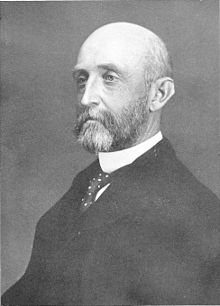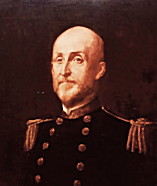This is an old revision of this page, as edited by Riapress (talk | contribs) at 15:20, 14 July 2006 (→Works). The present address (URL) is a permanent link to this revision, which may differ significantly from the current revision.
Revision as of 15:20, 14 July 2006 by Riapress (talk | contribs) (→Works)(diff) ← Previous revision | Latest revision (diff) | Newer revision → (diff)Rear Admiral Alfred Thayer Mahan (September 27, 1840 - December 1, 1914) was a United States Navy officer, geostrategist, and educator, widely considered the world's foremost theorist of military sea power. Several ships were named USS Mahan, including the lead vessel of a class of destroyers.
Early life and service
Born at West Point, New York to Dennis Hart Mahan (a professor at the United States Military Academy) and Mary Helena Mahan, he went to Columbia University for two years where he was a member of the Philolexian Society and then, against his parents' wishes, transferred to the Naval Academy, where he graduated second in his class in 1859.
Commissioned as a Lieutenant in 1861, Mahan served the Union in the American Civil War as an officer on Congress, Pocahontas, and James Adger, and as an instructor at the Naval Academy. In 1865 he was promoted to Lieutenant Commander, and then to Commander (1872), and Captain (1885).
Despite his success in the Navy, his skills in actual command of a ship were not exemplary; and a number of vessels under his command were involved in collisions, with both moving and stationary objects.
Naval War College and writings

He was appointed commander of the new United States Naval War College in 1886, where in 1887 he met and befriended a young visiting lecturer named Theodore Roosevelt. During this period Mahan organized his lectures into his most influential books, The Influence of Sea Power upon History, 1660-1783, and The Influence of Sea Power upon the French Revolution and Empire, 1793-1812, published 1890 and 1892, respectively.
The books' premise was that in the contests between France and England in the 18th century, domination of the sea via naval power was the deciding factor in the outcome, and therefore, that control of seaborne commerce was critical to domination in war. To a modern reader this may seem obvious and repeatedly demonstrated, but the notion was much more radical in Mahan's time, especially in a nation entirely obsessed with landward expansion to the west.
His books were received with great acclaim, and closely studied in Britain and Germany, influencing their buildup of forces in the years prior to World War I. Mahan's influence sowed the seeds for events such as the naval portion of the Spanish-American War and the battles of Tsushima, Jutland and the Atlantic.
Later career
Between 1889 and 1892 he was engaged in special service for the Bureau of Navigation, and in 1893 Mahan was appointed to command the powerful new protected cruiser Chicago on a visit to Europe, where he was received and feted. He returned to lecture at the War College and then, in 1896, he retired from active service.
Mahan continued to write voluminously and received honorary degrees from Harvard, Yale, Columbia, Dartmouth, and McGill.
He became Rear Admiral in 1906 by an act of Congress promoting all retired captains who had served in the Civil War.
Works
- The Gulf and Inland Waters (1883)

Captain Alfred T. Mahan - The Influence of Sea Power Upon History, 1660-1783 (1890) or as a free typeset PDF ebook optimized for printing at home
- The Influence of Sea Power upon the French Revolution and Empire, 1793-1812 (1892)
- Admiral Farragut (1892)
- The Interest of America in Sea Power, Present and Future (1897)
- Lessons of the War with Spain, and Other Articles (1899)
- The Problem of Asia and Its Effect Upon International Policies (1900)
- Types of Naval Officers Drawn from the History of the British Navy, with Some Account of the Conditions of Naval Warfare at the Beginning of the Eighteenth Century, and of Its Subsequent Development During the Sail Period (1901)
- Sea Power in Its Relations to the War of 1812 (1905)
- Naval Administration and Warfare: Some General Principles, with Other Essays (1908)
- Armaments and Arbitration; or, The Place of Force in the International Relations of States (1912)
- The Influence of Sea Power Upon History, 1660-1805 (abridged ed, 1980)
References
- Benjamin Apt, "Mahan's Forebears: The Debate over Maritime Strategy, 1868-1883." Naval War College Review (Summer 1997). Online. Naval War College. 24 September 2004.
- Philip A. Crowl, "Alfred Thayer Mahan: The Naval Historian" in Makers of Modern Strategy from Machiavelli to the Nuclear Age, ed. Peter Paret (Oxford: Clarendon Press, 1986)
- William E. Livezey, Mahan on Sea Power (Norman, OK: University of Oklahoma Press, 1981)
- W. D. Puleston, Mahan: The Life and Work of Captain Alfred Thayer Mahan (New Haven: Yale University Press, 1939)
- Robert Seager, Alfred Thayer Mahan: The Man and His Letters (Annapolis, MD: Naval Institute Press, 1977)
- Charles Carlisle Taylor, The Life of Admiral Mahan, 1920, London.
- Biographical article
- Works by Alfred Thayer Mahan at Project Gutenberg
External links
- Past Presidents of the Naval War College - from the Naval War College website